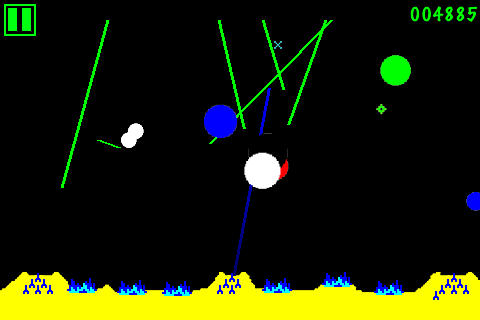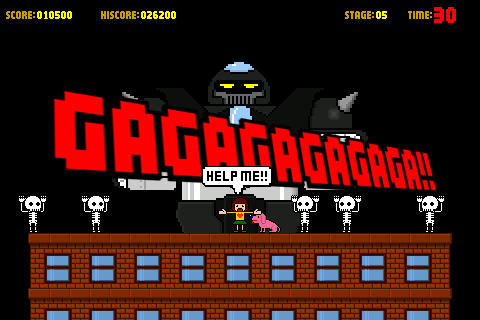I’ve been a gamer since the very early 1980s, and have owned more systems than you can shake a stick at. A year ago, I happily penned an article for this very site, suggesting iPod gaming was a crock of shit. And you know what? I was dead wrong… absolutely, painfully, utterly, astonishingly wrong. The fact is, iPod is the most exciting platform for gaming we’ve seen in years.
And individuals drive innovation. Because devs aren’t pandering to focus groups, they don’t feel compelled to water everything down into a grey and brown lump of boredom. Therefore, next to your Maddens, you’ve got crazed creations like Giant Metal Robot.
Looking back a year, I was making the exact same arguments everyone’s still making today. But with the benefit of nine months of iPod gaming under my belt, here’s how I’d respond to a ‘me’ one year back, and therefore respond to the anti-iPod-gaming crowd today.
1. A lack of controls
This was my main concern—a touch screen and tilt-based controls versus tactile, physical sticks and buttons. In some cases, this is problematic—it’s never a good thing to lose at a game because your thumb moved away from a virtual d-pad.
But here’s the thing: the best games work with the iPod rather than fighting against it and trying to replicate controls from other platforms. Therefore, you end up with a selection of games with more intuitive controls (tilt-based racers, Galcon‘s mouse-like touch-and-drag, Atari classic Missile Command ditching trackball-and-fire for prod-based targeting); and if you’re very lucky, a developer creates something truly unique, such as multi-touch modern classic Eliss (see the video below).
httpv://www.youtube.com/watch?v=7fELPZ26QRk
2. Dumbed down content
Arguments about a lack of depth were perhaps more relevant a year back when many of the games on iPod were extremely simple. However, even then, the likes of Trism showed the system had more to offer, providing a far more challenging take on match games than the likes of Bejeweled.
Today, there is a huge range of games on the store. And although the bias is still towards pick-up-and-play quickfire efforts, you can also find things like RPG Zenonia, a slew of asset management games, point-and-click efforts like The Secret of Monkey Island, and much more—and usually for a price a fraction of that on competing handhelds.
3. Expensive hardware
Again, what a difference a year makes. Today, the cheapest iPod touch—which is still perfectly suitable for gaming—comes in 30 bucks more than the DSi and 50 bucks less than the PSP Go is likely to cost on launch. But only when you take into account the price difference in the games (with App Store titles generally being $10 or under) does the true value of Apple’s handhelds as gaming devices become clear. At $299, a 32GB iPod touch might look extravagant, but buy 20 games and it looks like a comparative bargain against doing the same with a DSi or PSP.
4. Not fit-for-purpose
My argument here was that a device built for gaming would always trump a device designed primarily as a media player. But as devices evolve, it’s pretty clear multi-function is where we’re at and where everyone’s going. Therefore, arguing against iPod touch succeeding as a gaming device in the current market, simply because it wasn’t initially designed as such, is just pointless, especially given that there are now over 20,000 games, many of which are really very good indeed.
5. Apple’s track record in gaming
History suggested that Apple wouldn’t ever really show an interest in gaming. But, apparently, money talks. That Apple is pushing its handheld platform hard in the gaming arena speaks volumes. Gaming isn’t an added extra, a ‘nice to have’. For Apple, gaming is a major component of its handheld success.
Suggesting Apple can’t make it in this market is reminiscent of Nokia’s CEO saying PC guys would never get anywhere in the mobile/cell-phone market. Things change, and market leaders get complacent, enabling the new guy to give them a good kicking. Ultimately, what really matters is the here and now, and Apple’s doing just fine in that regard.

All of these positives combine to make a system with fantastic games. There’s so much variety and potential, and, as already noted, a market where creativity is primarily driven by individuals and small teams rather than corporations feeding you further iterations of last year’s games. At present, the only things that scupper the device’s chances are:
1. Poor battery life
An iPod touch really needs to last longer without being plugged in. The DSi can get well over ten hours of gaming at its lowest brightness setting, and about four at its highest. Apple’s devices struggle to get much more than a few hours when playing anything but the simplest and most undemanding games.
2. How the devices are named
Apple’s naming convention doesn’t help things. People think of iPhone games as being like the crap you got on Nokias five years back; similarly, they think of iPod touch and assume games for it will be simplistic fare. Sadly, it’s probably too late now for Apple to rename its devices, although an iPod touch ‘gaming edition’ of some kind might be a good marketing tactic.
3. General acceptance
Here’s the thing Apple has no real control over. There’ll always be a chunk of the market that’s anti-Apple regardless, and another chunk that considers itself ‘hardcore’ and therefore avoids iPod gaming out of principle (although, as I wrote on GamesRadar, you’re only a truly hardcore gamer if you’re tough enough to master a slew of games on Apple handhelds—not if you merely have the endurance to wander around brown forests for days or play Yet Another Grey FPS VII and get terribly excited about the very slightly nicer graphics than those in Yet Another Grey FPS VI).
But the tide is turning, albeit slowly. Multi-format print mags are discovering the devices, major publishers are getting interested in the platform for a range of games, and Apple itself—long a company seemingly hostile to videogames—has finally woken up to the fact that it has a platform that could revolutionise the industry.
Now go away—I want another game of Drop7.


